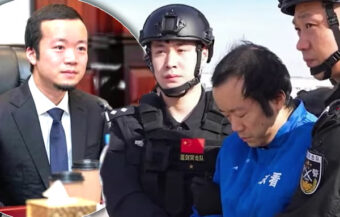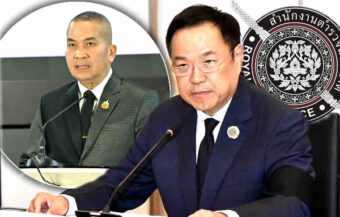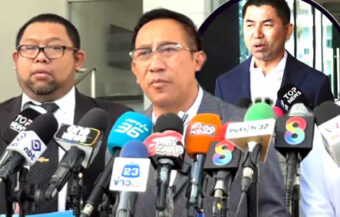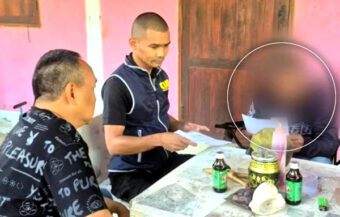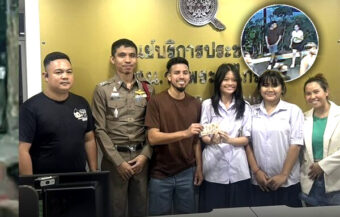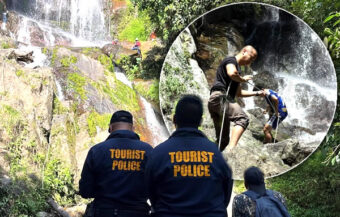Cambodian scam centre crisis shakes Thailand as ฿70 million of Ly Yong Phat’s assets are frozen. PM Anutin faces ministerial resignations, Wiroj threatens a no-confidence motion and warns failure to act risks elite exposure and collapse of the government.
The Cambodian scam centre crisis is fast threatening Prime Minister Anutin Charnvirakul’s new interim government. On Wednesday, firebrand People’s Party MP Wiroj Lakkhanaadisorn warned of a no-confidence motion, while Anutin himself earlier threatened to dissolve the House at will. The turmoil deepened as Deputy Finance Minister Woraphak Thanyawong quit and a Cambodian senator was found with ฿70 million frozen in Thailand, despite tycoon Ly Yong Phat’s long presence on the U.S. sanctions list. Wiroj says Hun Sen is preparing to expose Thailand’s elite just as he helped topple Paetongtarn Shinawatra’s government this summer. He is urging Anutin to act fast or risk Thailand being branded complicit in the widening scandal.
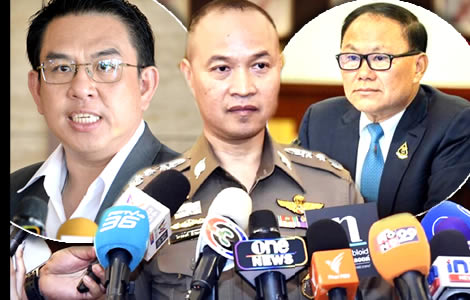
Thailand’s Anti-Money Laundering Office (AMLO) has frozen assets worth more than ฿70 million belonging to Cambodian Senator Ly Yong Phat, a tycoon long linked to casinos and scam operations on the Thai-Cambodian border. The dramatic move confirms what officials and foreign observers have warned for months — that Cambodia’s criminal networks have infiltrated Thailand’s financial system with growing confidence and reach.
AMLO sources said the order covers bank accounts, landholdings, and share assets tied to Ly Yong Phat’s Thai interests. The senator, who is also known by his Thai name Phat Suphapha, holds dual nationality and has operated extensive business interests inside Thailand for years. His Thai ID card was uncovered by investigators after months of quiet intelligence-gathering.
For Washington, Ly Yong Phat is not a new name. He has been on the United States sanctions list for several years over suspected corruption and money laundering. Yet, until now, no Thai agency had acted against him. That changed this week.
Thai authorities escalate war on Cambodian scam networks operating from casino hubs and border resorts
Officials said the seizure is part of a larger offensive against cross-border scam gangs, many of which base their call-centre operations in Cambodian casino complexes such as O-Smach Resort in Oddar Meanchey. The resort is owned by Ly’s LYP Group and has long been under scrutiny by regional intelligence units.
Police investigators say the Thai freeze applies only to domestic assets. However, they believe the senator’s Cambodian holdings are many times greater.
According to Pol Lt Gen Trairong Phiwphan, Commissioner of the Technology Crime Suppression Division (TCSD), Thai authorities are now coordinating daily with commercial banks through a newly strengthened “war room.” The centre tracks suspicious transactions in real time and moves immediately to block suspicious transfers.
“Since the system went live, we have prevented over 40% of outbound scam transfers,” Trairong said on Wednesday. “Every hour counts. Once money leaves Thai jurisdiction, recovery becomes nearly impossible.”
Thai cyber police reveal Cambodian interference as cross-border scams face intensified crackdown
He added that Thai cyber-police began targeting scam operations long before the current publicity wave. In August and September 2024, joint raids with Cambodian police produced more than 160 arrest warrants. Yet, he admitted, several missions were halted at the last minute by Cambodian officials. “Our teams were ready. Suddenly, permission was withdrawn. That tells you something about the obstacles we face,” he said pointedly.
The AMLO action followed a high-level directive from Prime Minister Anutin Charnvirakul, who met United States Ambassador Robert F. Godec on Tuesday. Their discussion reportedly focused on American law-enforcement measures against the Prince Group — a huge Cambodian conglomerate said to be tied to the Chinese 14K Triads and senior Cambodian leadership figures.
Only a day later, Deputy Finance Minister Woraphak Thanyawong resigned. He stepped down after the prime minister demanded an explanation for what insiders describe as “oversight failures” in financial supervision. The timing has added political shockwaves to an already tense situation.
Parliament reacts as Wiroj threatens censure motion over Thai complicity in cross-border scams
The seizure also triggered immediate reaction inside Parliament. Wiroj Lakkhanaadisorn, deputy leader of the People’s Party, accused the government of years of negligence. “If this administration does not expose every Thai involved in these networks, we will move a censure motion,” he declared. “The world is watching. If we delay, Thailand will be seen as a scam-hub country.”
Wiroj said Cambodian strongman Hun Sen had already warned that he would release the names of Thai politicians and investors who profited from illegal businesses in Cambodia. “If the Americans or Hun Sen reveal them before our own government acts, Thailand will lose face internationally,” he said.
Analysts note that the scandal reaches beyond cybercrime. The networks involved are accused of human trafficking, forced labour, and money laundering. Thousands of Thais and foreigners have fallen victim to fraudulent investment and romance scams originating from border casinos.
Wiroj insisted that these crimes could not operate without Thai collusion. “There are financiers, politicians, and officials who facilitate them. They must be exposed,” he said. “The money stolen from Thais is recycled to buy land, businesses, and influence inside our own country. That is treachery, not just corruption.”
Ministry of Interior investigates Ly Yong Phat’s Thai citizenship amid ongoing crackdown
Meanwhile, the Ministry of Interior has opened an inquiry into how Ly Yong Phat obtained Thai citizenship. Officials suspect irregularities in the application process. If wrongdoing is confirmed, his Thai nationality could be revoked. “We have clear evidence of dual identification,” one senior officer told reporters. “No one is above the law.”
In parallel, Thai police are tracking mule accounts that channel funds between Cambodian and Thai banks. Investigators say hundreds have been frozen. Yet thousands more remain active under nominee ownership. “Nominee networks make it difficult to trace final beneficiaries,” Trairong admitted. “But each frozen account disrupts the chain.”
Anutin has vowed that his government will cooperate fully with international partners. He told reporters that transparency and accountability are now national priorities. “We will show that Thailand is part of the global solution, not the problem,” he said.
Nonetheless, opposition pressure continues to mount. Wiroj warned that if no senior figures are charged within weeks, his party will trigger a full no-confidence debate. “We have given the government the chance to act. We will not wait forever,” he said.
People’s Party MPs assigned to monitor progress and push for international cooperation in scam cases
The People’s Party has formally tasked MPs Rangsiman Rome and Wiroj Lakkhanaadisorn with monitoring law enforcement progress. They plan to summon AMLO and TCSD officials before a parliamentary committee next month. “This is not ordinary fraud,” Rangsiman said. “It is organised crime with political protection. The victims include our citizens and foreign nationals.”
Wiroj has also demanded that Thailand strengthen cooperation with the United States, the United Kingdom, and ASEAN partners to trace financial flows. “Disclosure of money trails and real ownership is the most effective deterrent,” he said. “Scammers fear transparency more than police raids.”
He cited the Kok An Group, in addition to the Chen Zhi network, as another example of a criminal enterprise hiding behind legal fronts. “They cannot act alone,” he said. “Thai enablers exist, and their time will come.”
Billions in fraudulent funds flowing through Thai institutions, exposing gaps in enforcement
Officials at AMLO echoed his concern. One senior analyst said billions of baht in fraudulent funds have passed through Thai institutions in the past three years. “Scam money enters as online investment returns, is layered through mule accounts, then exits to crypto wallets abroad,” the source said. “Every successful freeze sends a message that Thailand is no longer a safe route.”
Still, many believe the problem has reached systemic levels. Criminal syndicates exploit gaps between Thai and Cambodian enforcement. Casinos provide both physical protection and financial cover. As one security source put it, “Casinos are the new banks of Southeast Asian crime.”
In Bangkok, financial regulators are also examining how senior Thai officials acquired stakes in companies with cross-border ties. Several names have surfaced in confidential AMLO briefings. None have yet been publicly identified, but insiders say the list is politically sensitive.
Public frustration is growing. Social-media users have demanded the government reveal the names of Thai passport holders involved in scam rings. Editorials in the domestic press describe the freeze on Ly Yong Phat’s assets as “only the beginning.”
Anutin hints at possible dissolution of Parliament amid political and international pressure
Anutin, facing both internal dissent and foreign scrutiny, hinted that he could dissolve Parliament if political paralysis deepens. “If the situation prevents effective governance, I will exercise my constitutional power,” he told reporters on Monday. The comment has further unsettled coalition partners.
Regionally, observers warn that the scandal may even further strain Thai-Cambodian relations. Phnom Penh’s cooperation is essential to dismantling networks operating from Poipet, Bavet, and O-Smach. Yet Cambodia’s own elite connections to these businesses make serious collaboration uncertain. “Hun Sen and Hun Manet know the evidence,” one diplomat said. “Their silence speaks volumes.”
International agencies are watching closely. Both the U.S. Treasury and Europol have shared data on money-laundering channels across ASEAN. The Financial Action Task Force has also flagged Cambodia’s vulnerabilities. If further violations are proven, the country could face renewed grey-list status, hurting investment and trade.
Wiroj said that would be justified. “Cambodia has protected these syndicates for too long. If financial pressure forces reform, so be it,” he said.
Thailand’s financial credibility is at risk if it fails to clamp down on cross-border scam networks
For Thailand, however, the greater risk is reputational. “If we appear to shelter scammers or politicians tied to them, our financial credibility collapses,” an AMLO advisor warned. “Foreign investors demand confidence in our systems. Without that, capital flees.”
Pol Lt Gen Trairong said the fight will continue regardless of politics. “We will trace every baht, every transfer, and every name,” he said. “The border is no shield.”
He also dismissed rumours that Cambodian scam gangs have shifted base to Thailand with South Korean workers. “We have checked all immigration data,” he said. “No verified evidence exists. The claims remain unsubstantiated.”
Nevertheless, police remain cautious. Intelligence suggests that some Cambodian operators have attempted to establish temporary safe houses inside northeastern provinces. Surveillance has been tightened around Sa Kaeo and Buriram. “We are watching closely,” Trairong said.
AMLO confirms further asset freezes under review as Thailand signals tougher stance on crime
By late Wednesday, AMLO confirmed that further asset-freeze proposals are under review. Additional warrants may be issued next week targeting other dual nationals suspected of facilitating money laundering.
The seizure of Ly Yong Phat’s fortune marks a decisive shift in Thailand’s posture toward cross-border crime. For years, allegations of collusion and official tolerance dogged every investigation. Now, the government appears determined to prove otherwise.
Deputy Minister of Finance Woraphak bows out after only 33 days amid furore over scammer centre claims
PM asks top minister for explanation as ex official claims Hun Sen started war to protect his scam centre industry
High powered, secretive meeting chaired by PM agrees robust action against Cambodian networks
Whether that determination survives political turbulence certainly remains to be seen. For the moment, the message from Bangkok is unambiguous — Cambodia’s shadow networks will no longer move money freely through Thailand’s banks. The challenge, however, as one seasoned analyst put it, “is not catching the minnows. It is whether the sharks will ever see the net.”
Join the Thai News forum, follow Thai Examiner on Facebook here
Receive all our stories as they come out on Telegram here
Follow Thai Examiner here
Further reading:
High powered, secretive meeting chaired by PM agrees robust action against Cambodian networks
Thailand and Cambodia face danger from ‘Dragon Head’ the Chinese mafia leader behind the scams
Cyber police and Money Laundering agency seek UK and US co-operation targeting Cambodian networks
United States, South Korea and United Kingdom act against Cambodian scam industry with Thai tie-ins
Ben Smith affair & allegations of links to Cambodian scam centres continues to rage in parliament
Defiant Rangsiman Rome warns he’s not just fighting a defamation case but for the future of Thailand
Ben Smith money fixer to the elite in Thailand lines up ฿100M defamation case against Rangsiman Rome











